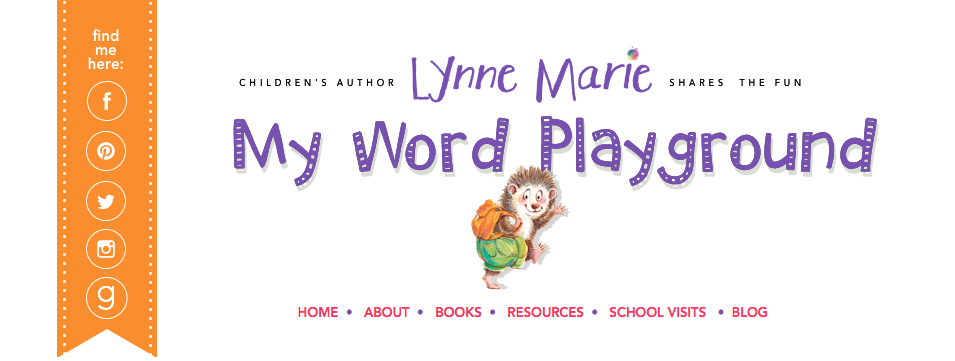 |
| http://amzn.to/1R7Ha15 |
Thanks so much for asking me
to write a post for your blog, Lynne Marie!!
In thinking about what I could share, I focused on what helped me the
most with my upcoming picture book, Norbert’s
Big Dream. I’ve written many blog posts
in the past – usually having something to do with writing in rhyme, as my first
two books are rhymers. But, Norbert is my first non-rhymer, so I
thought I’d write about something non-rhymey (hey – if Dr. Seuss can make up
words!).
In November of 2013, I
attended our annual Illinois SCBWI conference, Prairie Writers and Illustrators
Day, which was about a year before I sold Norbert. One of the sessions I attended was “Dummies
for Smarties: The Relationship Between Story and Design”, presented by Sylvie Frank from Paula Wiseman
Books. I’d never made a book dummy
before and decided to work on Norbert’s
Big Dream at this session. Even
though I felt Norbert was “submission
ready”, I thought creating a dummy might help me improve it.
To make the dummy, we cut
four pieces of printing paper into quarters and stapled them together along one
edge, to make a 32-page book. If you
want a larger book, you can cut or fold 16 pieces of paper in half. I think Sylvie was trying to save a tree, which
I appreciated!
We left the first three pages
for the title page, copyright information and dedication and started the text
of the story on page 4. We then cut the sentences
of our story and placed them on the pages of the dummy. Once we were happy with where they were, we glued
them on the pages. (Hint: use just a little glue because you’re bound to make
changes.) I sometimes drew very crude
sketches (the only kind I know how to draw) or I wrote a short note about what
I thought the illustration could be.
Deciding where to put each
sentence, and sometimes dividing sentences, was more challenging than I’d
expected. I was surprised at how many
changes I ended up making on a story with such a low word count.
Here’s how creating a dummy
for Norbert helped me:
1 - I thought more visually
about the story. I was forced to imagine
where the illustrations would go on each page.
2 - I cut some of the text
because I could see how the illustrations could/should replace them.
3 – I broke up sentences or
paragraphs where there was a change of action or scene.
4 - I spotted redundancies
and cut some of them.
5 – I could see the pacing
more clearly, making it easier to break up the text to build tension and lead
to a satisfying conclusion.
6 - I sequenced events in a
more logical order.
7 – I created more compelling
page turns.
8 - I improve word
choice. Seeing the sentence alone on the
page allowed me to think solely about that one sentence, making it more obvious
when the language needed to be tightened or enriched.
 |
| http://amzn.to/1U474cl |
9 - After the dummy was
finished, reading the “book” allowed me to more objectively judge its
readability and flow.
10 – I couldn’t wait to get
home and rewrite the story!
In the end, the manuscript
that was accepted had the same word count (three words less) but it was a more
tightly written and a better-paced story that left lots of room for the
illustrator to do his thing! So, when
you finish a manuscript and think it’s ready to submit to an editor or agent,
take the time to create a dummy before sending it out – you may be surprised
how “not ready” it really is!
 |
| http://amzn.to/1XdufPI |
I have a bonus tip for you - Two
of the three manuscripts I sold were bought by editors I’d met at SCBWI
conferences. So, I highly recommend
going to conferences and following up with submissions to editors and agents
who presented there. Both of my editors spoke
at smaller, state-level conferences, so you don’t have to go to the huge,
international conferences in NY and LA (though they’re amazing).
BIO:
 Lori Degman
is teacher of the deaf by day and an award winning picture book author by
night, weekend and school holiday. She has three picture books: 1 Zany Zoo, Simon
& Schuster (Cheerios New Author Contest winner & Mom’s Choice Award); Cock-a-Doodle
Oops!, Creston Books (2015 International Literacy Association Honor
Book & Mom’s Choice Award); and Norbert’s Big Dream, Sleeping Bear
Press, coming August, 2016.
Lori Degman
is teacher of the deaf by day and an award winning picture book author by
night, weekend and school holiday. She has three picture books: 1 Zany Zoo, Simon
& Schuster (Cheerios New Author Contest winner & Mom’s Choice Award); Cock-a-Doodle
Oops!, Creston Books (2015 International Literacy Association Honor
Book & Mom’s Choice Award); and Norbert’s Big Dream, Sleeping Bear
Press, coming August, 2016.
























































